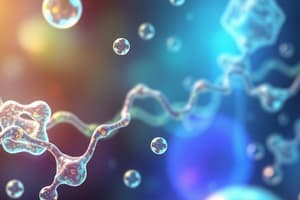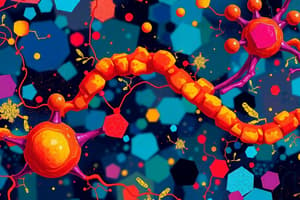Podcast
Questions and Answers
What is the primary purpose of glycolysis in cellular respiration?
What is the primary purpose of glycolysis in cellular respiration?
- To synthesize proteins for energy
- To extract energy from glucose (correct)
- To convert ATP to ADP
- To produce glucose from fatty acids
Which factor does NOT influence enzyme activity?
Which factor does NOT influence enzyme activity?
- Temperature
- Substrate concentration
- Color of the enzyme (correct)
- pH
Which statement is TRUE regarding cellular respiration?
Which statement is TRUE regarding cellular respiration?
- Glycolysis occurs in the mitochondria.
- It can only occur in aerobic conditions.
- The Krebs cycle occurs in the cytoplasm.
- ATP is produced during all stages of cellular respiration. (correct)
In photosynthesis, which process is responsible for converting light energy into chemical energy?
In photosynthesis, which process is responsible for converting light energy into chemical energy?
What kind of reactions involve the transfer of protons?
What kind of reactions involve the transfer of protons?
What is the primary focus of biochemistry?
What is the primary focus of biochemistry?
Which biological macromolecule is primarily responsible for catalysis in living organisms?
Which biological macromolecule is primarily responsible for catalysis in living organisms?
What are the building blocks of proteins?
What are the building blocks of proteins?
Which of the following describes catabolism?
Which of the following describes catabolism?
What type of molecule is DNA primarily responsible for?
What type of molecule is DNA primarily responsible for?
Which type of carbohydrate is primarily used for energy storage in animals?
Which type of carbohydrate is primarily used for energy storage in animals?
What role do phospholipids play in living organisms?
What role do phospholipids play in living organisms?
Which process is essential for the production of ATP in cells?
Which process is essential for the production of ATP in cells?
Flashcards
What is biochemistry?
What is biochemistry?
The study of chemical processes that occur within and relate to living organisms.
What are biological macromolecules?
What are biological macromolecules?
Large molecules found in living organisms, such as proteins, carbohydrates, lipids, and nucleic acids.
What is a protein?
What is a protein?
A chain of amino acids linked together, with diverse functions like catalysis, transport, and structural support.
What is anabolism?
What is anabolism?
Signup and view all the flashcards
What is catabolism?
What is catabolism?
Signup and view all the flashcards
What is ATP?
What is ATP?
Signup and view all the flashcards
What is metabolism?
What is metabolism?
Signup and view all the flashcards
What is DNA?
What is DNA?
Signup and view all the flashcards
What are enzymes?
What are enzymes?
Signup and view all the flashcards
How do enzymes work?
How do enzymes work?
Signup and view all the flashcards
What are the stages of cellular respiration?
What are the stages of cellular respiration?
Signup and view all the flashcards
What is cellular respiration?
What is cellular respiration?
Signup and view all the flashcards
Study Notes
Introduction to Biochemistry
- Biochemistry is the study of the chemical processes within and relating to living organisms.
- It focuses on the structure, function, and interactions of biological macromolecules, such as proteins, carbohydrates, lipids, and nucleic acids.
- This includes the study of metabolism, enzyme catalysis, and the molecular basis of genetic information.
Importance of Biochemistry
- Fundamental to understanding life processes at a molecular level.
- Crucial for advancements in medicine, biotechnology, and agriculture.
- Helps explain the mechanisms of diseases and develop therapeutic strategies.
- Provides tools for understanding evolutionary relationships between organisms.
Biological Macromolecules
- Proteins: Composed of amino acids; diverse functions, including catalysis, transport, and structural support.
- Amino acids are the building blocks, with various side chains influencing the protein's properties.
- Protein structure is crucial for function; primary, secondary, tertiary, and quaternary structures exist.
- Protein folding is complex and influenced by environmental conditions.
- Carbohydrates: Composed of sugars; important for energy storage and structural support (e.g., cellulose).
- Simple sugars (monosaccharides) are basic building blocks.
- Complex carbohydrates (polysaccharides) are formed by linking monosaccharides.
- Starch and glycogen are examples of storage polysaccharides.
- Lipids: Diverse group including fats, phospholipids, and steroids; key components of cell membranes and energy storage.
- Fats are composed of fatty acids and glycerol; saturated and unsaturated fats exist.
- Phospholipids form the bilayer structure of cell membranes.
- Steroids have diverse functions, including hormone regulation.
- Nucleic Acids: DNA and RNA; crucial for genetic information storage and transfer.
- DNA stores genetic instructions; its structure is a double helix.
- RNA is involved in protein synthesis and other cellular processes; has single-stranded structures.
- DNA replication and transcription are essential processes for cell function.
Metabolism
- Metabolism refers to all the biochemical reactions occurring in an organism.
- Catabolism: Breakdown of complex molecules into simpler ones, releasing energy.
- Anabolism: Synthesis of complex molecules from simpler ones, requiring energy.
- Cellular respiration is a key catabolic pathway for producing ATP, the cell's energy currency.
- Glycolysis, the Krebs cycle, and the electron transport chain are central to cellular respiration.
- Photosynthesis is the anabolic process used by plants to convert light energy into chemical energy.
Enzymes
- Enzymes are biological catalysts; proteins that speed up biochemical reactions.
- They lower activation energy, allowing reactions to proceed faster.
- Enzymes have specific active sites that bind to substrates.
- Enzyme activity is influenced by factors like temperature, pH, and substrate concentration.
Cellular Respiration
- Process of extracting energy from organic molecules (glucose) to produce ATP.
- Glucose is broken down in a series of reactions:
- Glycolysis (cytoplasm)
- Krebs cycle (mitochondria)
- Electron transport chain (mitochondria)
- ATP is the main energy currency in cells.
- Cellular respiration can be aerobic (requiring oxygen) or anaerobic (without oxygen).
Basic Concepts
- pH: Measures the concentration of hydrogen ions in a solution.
- Buffers: Solutions that resist changes in pH.
- Acid-base reactions: Involve the transfer of protons (H+).
- Redox reactions: Involve the transfer of electrons.
Studying That Suits You
Use AI to generate personalized quizzes and flashcards to suit your learning preferences.




